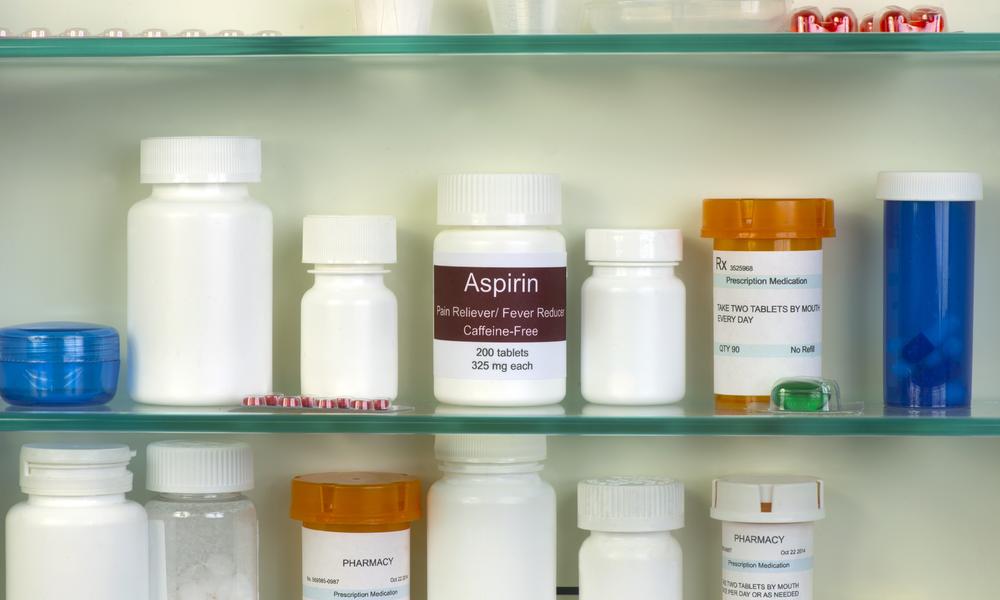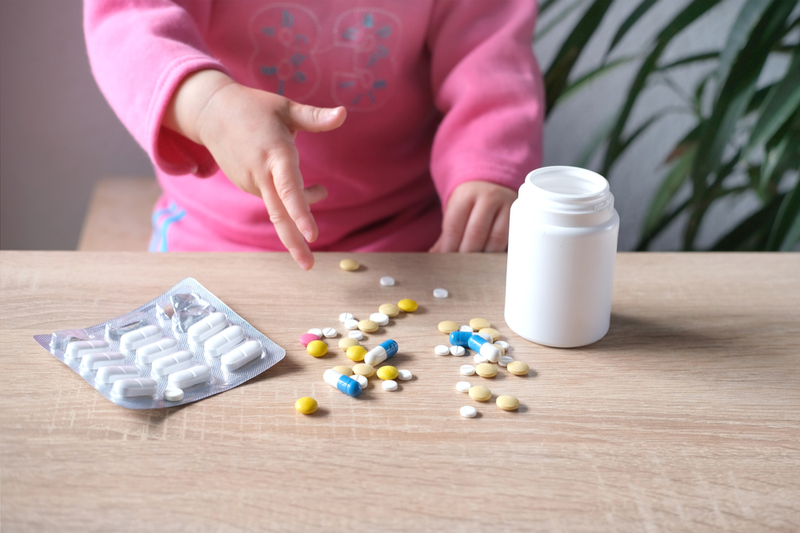Keeping medicine safely out of reach of children should be every parent’s highest priority. Kids can be curious about colorful pills, and attracted by sweet-tasting syrups and items like gummy bear vitamins and melatonin. Children are good at finding ways to get to what they think of as candy the minute you look away. But it is not candy that is sending over 50,000 children to emergency rooms each year. Protect your child from an accidental overdose by making sure safety caps are locked, and by keeping vitamins and medication out of reach of resourceful little climbers.
In the US, 8 out of 10 adults and half of all children take regular prescription medication. That medication can keep us healthy and may even save lives. But prescription medication can also be deadly when not taken as directed or when taken by the wrong person, for example a child. It is easy to see how it can happen. You fill a glass from the kitchen tap and swallow a pill, and the dryer buzzes at exactly that moment. You set down the pill container—just for a minute—while you attend to the laundry, and when you return, there is your child, with a chubby little handful of pills.
You cannot keep your eyes on your child every waking moment of the day even if you are the most careful parent in history. Folding a shirt, for example, requires you to look at what you are doing. But all your child needs is for you to look away for an instant in order to snatch that container of medicine off the kitchen counter or your nightstand. That is why the only way to really keep a child safe from an accidental overdose is to keep medicine safely out of reach and locked up tight.
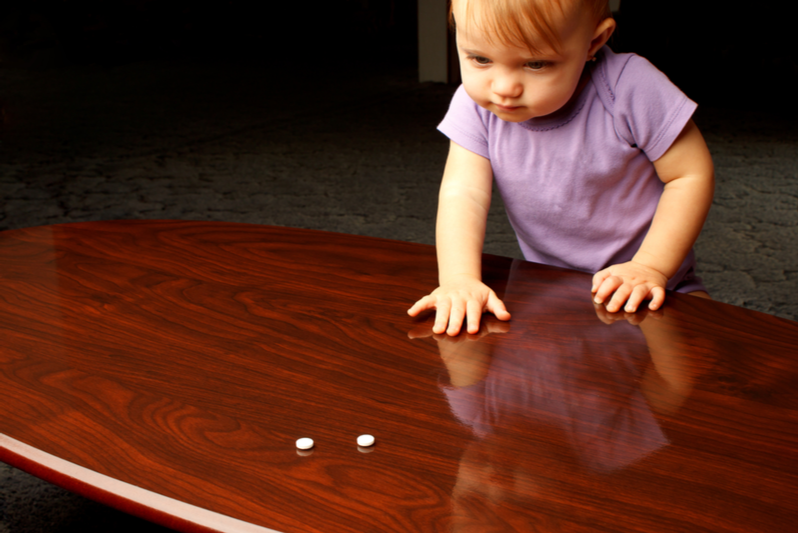
Kids Like to Test Boundaries
You may have talked to your child a gazillion times about not taking medicine without a parent’s permission, and well you should. But having spoken to your child about the dangers of taking medicine on their own is not something you can rely on to keep your child safe. Kids like to test the boundaries, and often act on impulse, looking for immediate gratification.
Of the children who end up in emergency rooms for accidental overdose, most—some 75 percent—are only one or two years old. As you might have noticed, children of that age learn about the world by putting items of interest into their mouths—and often swallowing them. Your child may be attracted to explore pills because they have interesting shapes and colors. Fruit-flavored medications made for children may feel like an irresistible temptation to your small child.
The scenarios that lead to an accidental child overdose are numerous and easy to imagine. Perhaps your child is being treated with antibiotic liquid for an ear infection. You give the child a dose of medicine, and the child would like some more because it tastes like bubblegum. A clever and resourceful child will be watching for the time you look away, so they can climb up and get some.
Keeping Children Safe
Most of the time keeping children safe is about childproofing your house to block their access to anything that poses a danger, such as a kitchen drawer filled with knives, or an electrical outlet. But sometimes we don’t think about items that are in temporary use, such as medication prescribed only for a week or so. Then all it takes is for you or your caregiver to leave the room for a minute for your child to swipe that yummy-looking medication off the kitchen table and scarf it down.
These examples prove that we must always be one step ahead of our children in order to keep them safe. It comes down to imagining potential dangers before they happen. That certainly applies to being on guard about the medications in your home.
Never forget to put medicine or vitamins away after you give you or your child a dose. Listen for the click when closing child-resistant caps and test with an extra twist to make sure they are locked tight. Keep medicine safely out of reach of children, high up in a cabinet you can lock. After all, even parents have to go to the bathroom sometimes. Taking precautions about the medications in your home means your child is safe for the short time you are out of view.
Use every measure to keep children safe from accidental overdose. We may curse child-resistant packaging and safety caps for being difficult for even adults to open. But child-resistant is not childproof. That is why relying on protective caps and packaging is good, but definitely not enough. Medicines, vitamins, supplements, and OTC sleep aids such as melatonin, must all be not only in closed protective packaging, but stored safely out of reach of your child.
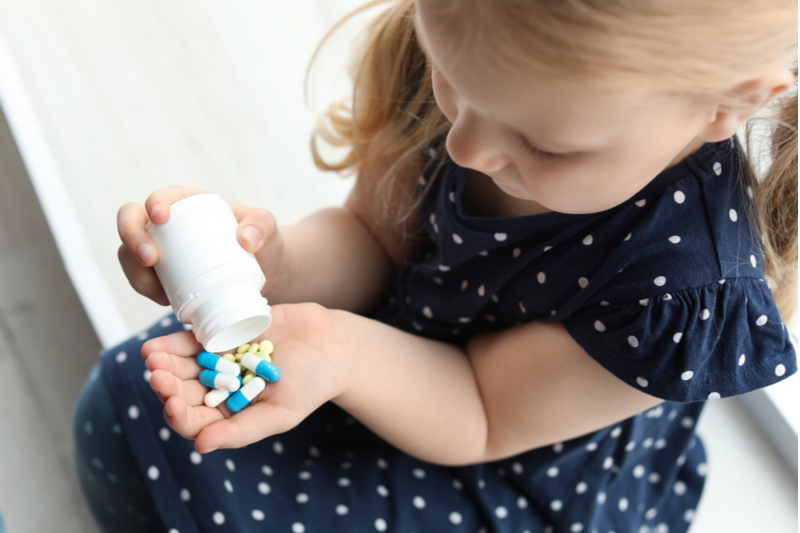
Remind Guests
Be prepared for the unexpected. You may be taking all the proper precautions against your child getting to the medications in your household. But sometimes a potentially dangerous situation escapes our attention. Houseguests and visiting relatives, for example, may have medication with them. Make sure to remind guests to keep their medications safely away from your child. Provide or suggest a place for them to store these items. Check to see visitors don’t leave medicine within reach of a child, for instance in a handbag, or the pocket of a suit jacket slung over a dining room chair.
Teach children what medicine is and why it is important. Make medication safety an ongoing conversation. Stress that children should never take medicine unless you or a caregiver gives it to them. Never tell children that medicine is candy, even if they are afraid to take it because they think it will taste icky. You can tell them that the medicine has been sweetened for children.
Be prepared in case of emergency. Save the Poison Help number (800-222-1222) to your phone to keep it handy. Call right away if you think your child may have taken something, even if you’re not sure. Stick the Poison Help number to your refrigerator with a magnet where caregivers, grandparents, babysitters, and older siblings can also see it. Point out the number to them and make sure they know what to do if your child takes something they shouldn’t.
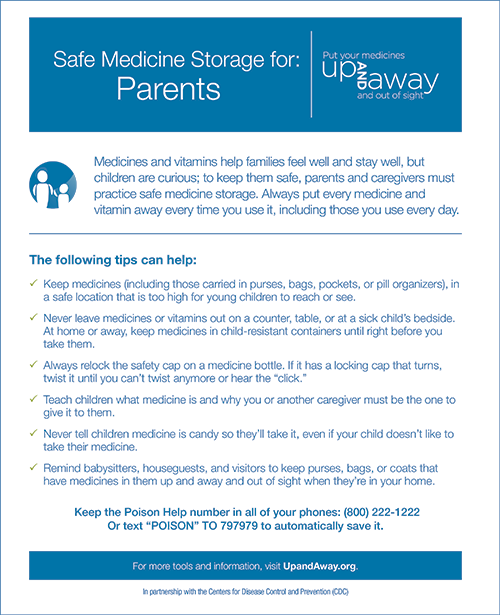
Keeping Medicine Safely Out of Reach of Children: A Checklist
- Store all medicines out of reach of children
- Put medication away after each use. Never leave medicine on the kitchen counter or at your child’s bedside, even for a short time.
- Close the safety cap every time you use medication, and double check to make sure the cap is locked in place.
- Store medicines in their original packaging, if possible. If you need to use a weekly pill organizer or travel bottle, look for containers that are child-resistant.
- Keep medication in its container until it is time for a dose. It may seem convenient to set up the next dose and leave it out as a reminder for later, but this poses a danger to your child. Instead, set up a reminder or a timer on your phone.
- Caution guests about storing medications safely out of reach of children when in your home.
- Talk to children about medicine. Explain that it is important to take medicine only when given to them by you or another caregiver. Never tell children that medicine is candy, and try not to emphasize the sweet taste of child medication, even when they don’t want to take it.
In Case of a Possible Overdose
If you think your child may have taken medicine they shouldn’t, check their mouth, and gather any medication you think they may have gotten into. Call the national toll-free Poison Help Line (1-800-222-1222) for advice.
Call 911 immediately if your child suddenly collapses, has trouble breathing, cannot be awakened, or is having a seizure.
Keeping medicine safely out of reach of children is the best way to keep them safe from an accidental overdose. But alongside such precautions, it is important for us to teach children what they need to know about medication. Be ready to answer their questions. Know that these lessons bear repeating from time to time. Most of all, know that children may not always be listening, but over time they can and will absorb the lessons we give them on safety, because such lessons always come from the heart.
